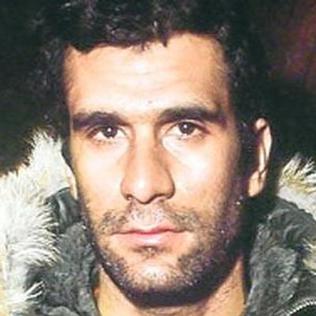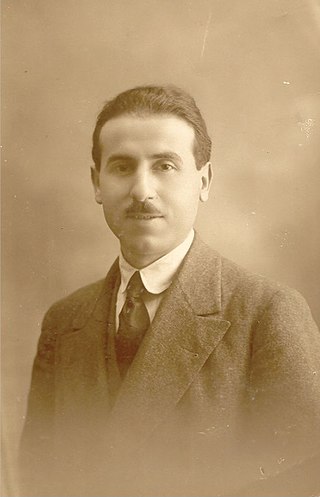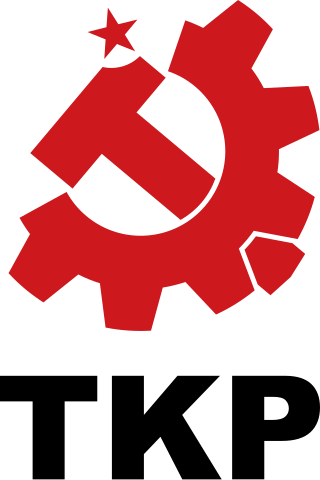
The Communist Party of Turkey was a political party in Turkey. The party was founded by Mustafa Suphi in 1920, and was soon to be banned. It worked as a clandestine opposition party throughout the Cold War era, and was persecuted by the various military regimes. Many intellectuals, like Nâzım Hikmet, joined the party's ranks. In 1988, the party merged into the United Communist Party of Turkey, in an attempt to gain legal status. The TKP was active from 1920 until its dissolution in 1988, and it was banned in Turkey in 1925 in order to ensure the country's security after the Sheikh Said Rebellion in Eastern Turkey. The party was legalized again after the Second World War, albeit with very limited power and it was heavily monitored by the Turkish government. However, after 1947 it was banned yet again and many of its leading figures were arrested and detained by the authorities. Initially adopting non-violent methods of introducing reform, the party began to adopt revolutionary viewpoints in the 1960s until its dissolution.

The Labour Party of Turkey was a socialist political party in Turkey, led by Mihri Belli. TEP was founded in 1975, and sought to fill the political void created by the banning of the Workers' Party of Turkey (TİP) in 1971. The party remained a small organization. The leaders of the party were subjected to a lengthy political trial and suffered violent attacks. The party was banned in 1980 for promoting usage of Kurdish language in schools.

Mehmet Ali Aybar was a lawyer, member of the Turkish parliament, the second president of the Workers Party of Turkey, the founder and President of the Socialist Revolution Party, and a member of the Russell Tribunal against the war crimes of the United States in Vietnam. He is known as one of the most prominent proponents of democratic socialism in Turkish political history.

Deniz Gezmiş (27 February 1947 – 6 May 1972) was a Turkish Marxist-Leninist revolutionary, student leader, and political activist in Turkey in the late 1960s. He was one of the founding members of the People's Liberation Army of Turkey (THKO).
Behice Boran was a Turkish Marxist-Leninist politician, author and sociologist. As a dissenting political voice from the far-left, Boran was repeatedly imprisoned for her work and died in exile after the Turkish military coup of 1980.
Osman Mümtaz Soysal was a Turkish professor of constitutional law, political scientist, politician, human rights activist, ex-prisoner of conscience, senior advisor, columnist, and author.
Harun Karadeniz was a Turkish political activist and author. He was the student leader of the late 1960s generation in Turkey and the chair of the Student Union of Istanbul Technical University. Together with other prominent student leaders such as Deniz Gezmiş, he was one of the student leaders who organized the famous 1968 protest against the American Navy's Sixth Fleet arriving at the Port of Istanbul, although he was initially against protesting at the docks themselves.
Şevket Süreyya Aydemir was a Turkish writer, intellectual, economist, historian, and one of the founders, publisher and a key theorist of Kadro ("Cadre"), an influential left-wing political journal published in Turkey from 1932 to 1934.

The Turkish Workers and Peasants Socialist Party was a socialist party founded in Istanbul on 22 September 1919. Şefik Hüsnü, Ethem Nejat, Ahmet Akif, Sadrettin Celal, Nafi Atuğ Kansu, Cevat Cevdet and Namık İsmail were prominent members. Because Istanbul was militarily occupied by Britain and France the party suspended its activities.

The Communist Party of Turkey is a communist party in Turkey. It was founded as the Socialist Power Party on 16 August 1993. In 2001, the party changed its name to the Communist Party of Turkey (TKP) and took over the historical legacy of the TKP.
Hikmet Ali Kıvılcımlı was a Turkish communist leader, theoretician, writer, publicist, and translator. He was the founder of the Vatan Partisi (VP).

İlhan Selçuk was a Turkish lawyer, journalist, author, novelist and editor.
Political violence in Turkey became a serious problem in the late 1970s and was even described as a "low-level civil war". The death squads of Turkish right-wing ultranationalist groups, sometimes allied with the state, inflicted around 5,000 casualties with the motivation of acting against the resistance of the left-wing opposition. Most of the victims were left-wingers. The level of illegal violence lessened for a while after the 1980 Turkish coup d'état, until the Kurdish-Turkish conflict erupted in 1984.
Aydınlık is the newspaper of the Patriotic Party. Originally launched as a weekly newspaper in 1921, it has been repeatedly closed and relaunched, most recently in 2011.

Kemal Burkay is a Kurdish writer and politician.
Yön was a weekly Turkish political magazine published between 1961 and 1967. It was a Kemalist and leftist magazine. In fact, Yön was more than a publication in that its contributors represented a political movement in the 1960s, Yön movement, which was a successor of the leftist-Kemalist movement in the 1930s known as Kadro movement. The latter also gathered around a publication, Kadro.
Socialist Revolution Party was a political party in Turkey.

The Workers' Party of Turkey is a political party in Turkey. The party was founded out of a split in the Communist Party of Turkey (TKP). As a result of the internal strife between two rival factions, the group led by former chairman Erkan Baş initially established People's Communist Party of Turkey (HTKP) in 2014, and after three years, it was rebranded as the Workers' Party of Turkey in 2017.
İdris Küçükömer was a Turkish academic, philosopher and economist whose views has been influential in Turkish politics. He developed an alternative interpretation of Kemalism from the mid-1960s to his death.
Cemal Reşit Eyüpoğlu was a Turkish finance officer, lawyer, politician and journalist. He was a member of the Republican People's Party (CHP). He served at the Parliament from 1950 to 1954 and the Constituent Assembly in 1961. He was a leftist and Kemalist figure and cofounded some publications, including Yön and Devrim.








